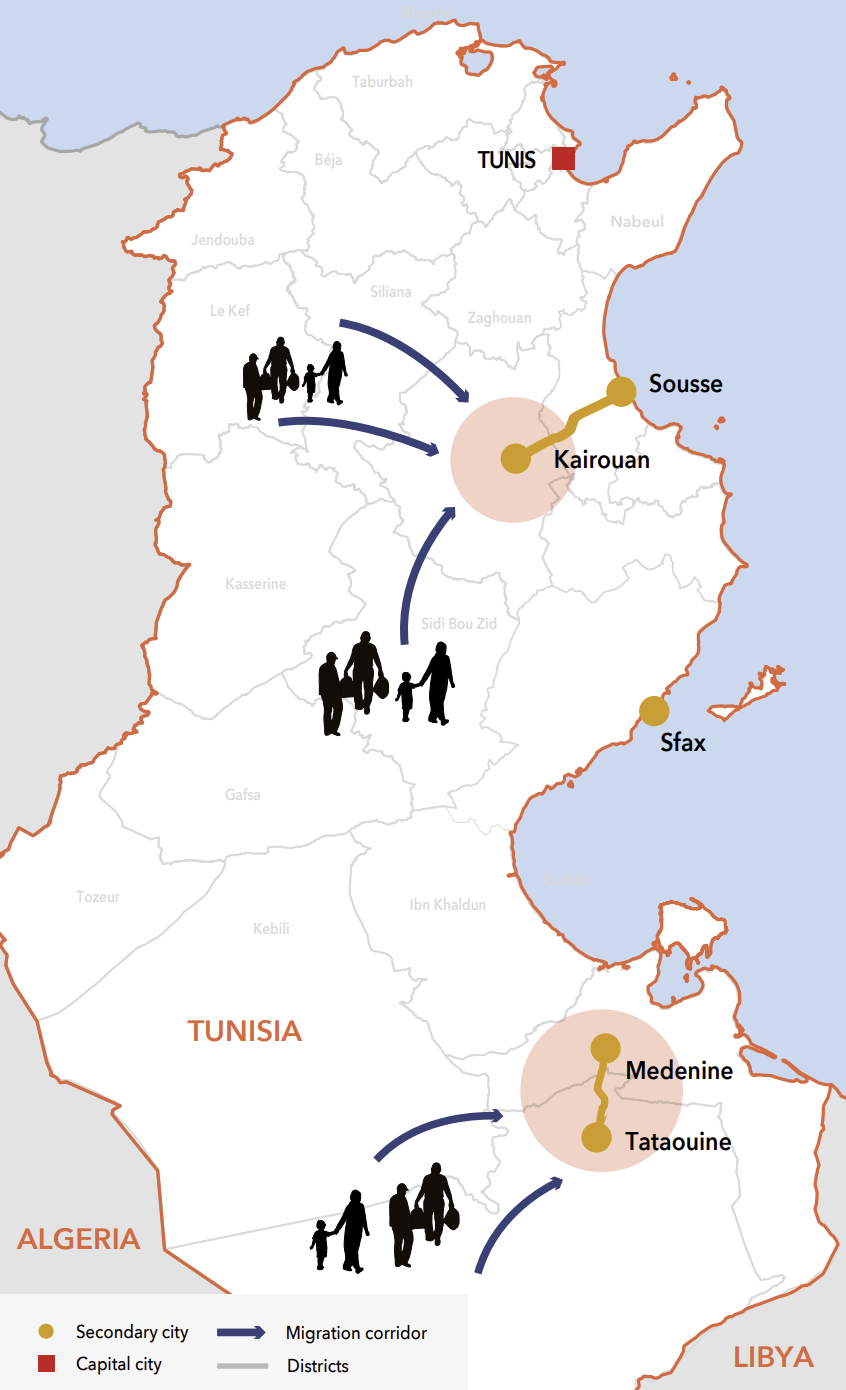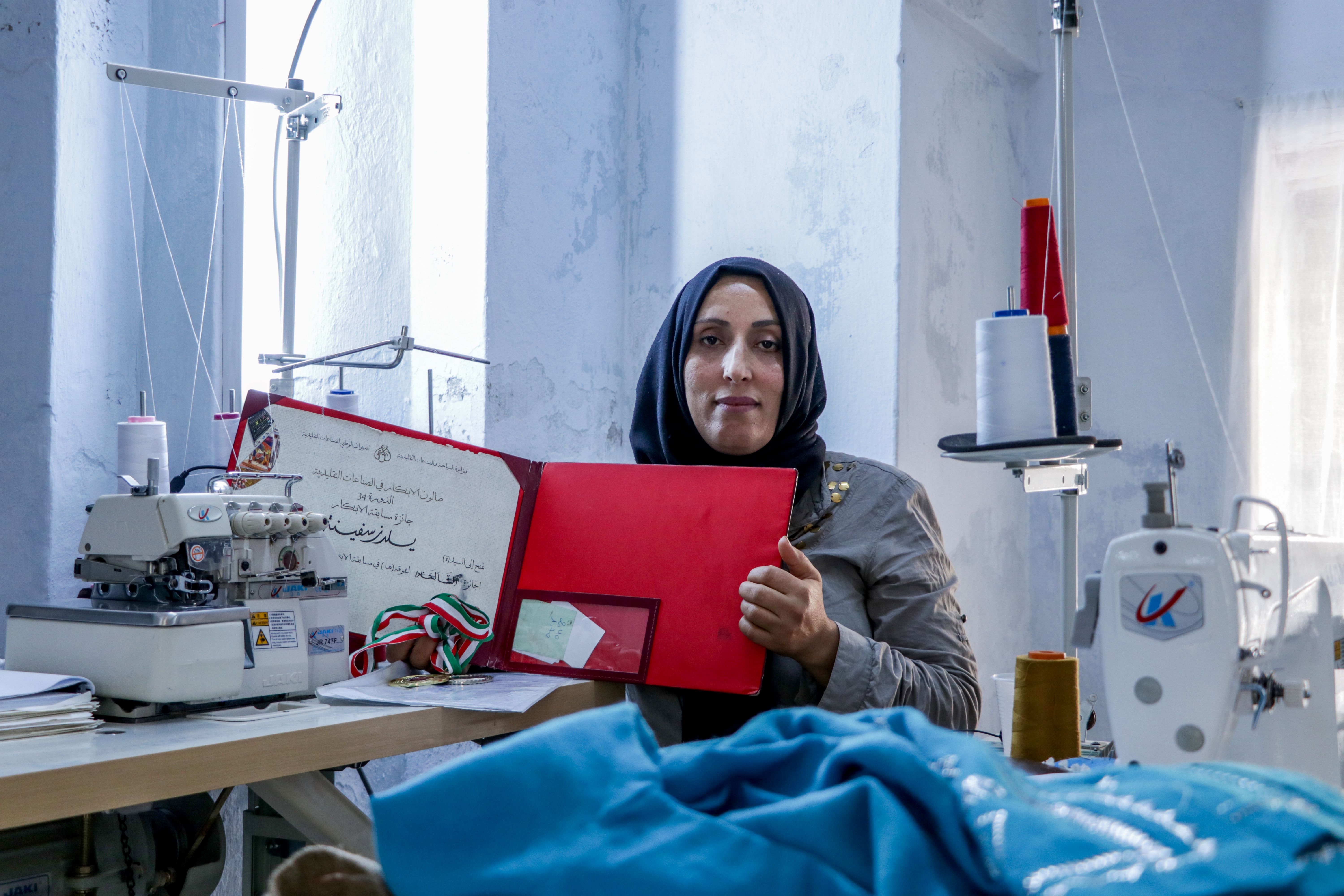Internal labour migration is a major phenomenon in Tunisia. It is a direct result of stark socioeconomic disparities between the disadvantaged interior regions and the more dynamic, prosperous coastal regions.
Municipalities that already lack human and financial resources face challenges in integrating young labour migrants from rural areas while remaining attractive to their original residents, providing equitable access to quality public services, and providing economic opportunities to all residents across the municipal territory.
This project aims to promote economic inclusion of rural-urban migrants and poor host communities along the migration corridors surrounding the municipalities of Kairouan, Medenine, and Tataouine.
It focuses on collaborative approaches with the private sector and public authorities to enhance efficiency, scale, and sustainability of the interventions.
It also adopts an integrated territorial development approach that emphasises a more equitable distribution of employment opportunities and municipal services across the entire municipal territory.
The project particularly aims to benefit Tunisian women, who face more obstacles than men in accessing jobs, support programmes, and financial services.
Migration and Gender Inequality in Tunisia
In recent years, territorial reforms have expanded municipal boundaries to include large urban, peri-urban, and rural areas; some cities are now 30‒40 times their original size.
Lack of accessibility and quality of basic services have entrenched persistent gender inequalities in more remote areas of Kairouan, Medenine, and Tataouine.
Long distances and poor public transport to urban service centres (often 30 to 40 km) disproportionally affect women and severely reduce their mobility.
Their primary role of managing the household and family, and the related social norms and institutional factors, prevent women from participating more actively in public, economic, and socio-cultural life.
29% of Tunisian women participate in the labour market, compared to 71% of men.
Tunisian women earn 20–40% less than men and suffer from a highly gendered division of labour.

Partners
National Union of Tunisian Women (UNFT) Kairouan and Tataouine regional bureaus, Skills to Succeed, the Local Democracy Agency (LDA), and the Tunisia Ecotourism private enterprise.
Activities
Access to work-related services for those outside urban centres
This project will work closely with the national employment agency (ANETI), training institutes, and their local branches to provide improved access to work-related services for populations who live further away from the urban centres of Kairouan, Medenine, and Tataouine, including many internal migrants. It will also improve the quality of the services, with a specific focus on high-potential sectors.
New Citizen Spaces
These one-stop shops for administrative municipal services, such as permits, will be established in areas far from existing administrative centres to make municipal services more accessible, transparent, and efficient. They will be strategically located to serve various communities at once.
New business incubation and coworking centre in Tataouine
The first of its kind in the region, the centre will fill an important gap in the local business ecosystem and provide a collaborative platform for institutional actors and the private sector.
Phase I Results
From 2019‒2022, Cities Alliance worked with Jendouba and Kairouan to strengthen their capacity to receive, manage, and integrate labour migrants. Both cities designed projects to test approaches from the tourism sector to increase their attractiveness as places to live, work, and invest.
The projects developed new tourism products in partnership with regional authorities and trained youth in providing tourism services and running their own tourism entities. Collaborations with influential domestic and foreign travel bloggers led to great interest on social media in the regions as travel destinations and in the entrepreneurs’ products.
The second phase scales up the interventions across the Kairouan and Medenine-Tataouine corridors.
Anticipated Results
The national employment agency (ANETI), its regional offices, and other public and non-governmental actors have received substantial technical and financial support from major development partners to improve and extend their work-related services.
The idea is to create more and better jobs by reducing the gap – which is often large – between the skills and profiles of job seekers and the requirements of the local labour market.
This project works closely with ANETI, training institutes, and their local branches to enable populations who live further away from the urban centres of Kairouan, Medenine, and Tataouine – including many internal migrants – to access the work-related services. It will also further improve the quality of the services, with a specific focus on high-potential sectors.
- Partners will run information campaigns about the existing employment and business support programmes to reach job seekers in far-away areas, targeting at least 1,500 people.
- 150 local companies will be sensitised to the opportunities of free-of-charge further education programmes for their employees.
- At least 1,000 people will benefit from a new, enhanced training curriculum developed through the project. Training institutes and business support entities will offer modules in high future-demand sectors, including the green and circular economy – improving the quality and portfolio of their job and business programmes.
- 450 entrepreneurs will be coached, mentored and trained to ensure they have the necessary skills and resources for their businesses to thrive.
In Tataouine, a business incubation and coworking centre – the first of its kind in the region – will fill an important gap in the local business ecosystem and provide a collaborative platform for institutional actors and the private sector.
At least 500 beneficiaries will experience new or better work opportunities as a result of these services provided by the project.
Multi-stakeholder dialogues
The project will convene two local multi-stakeholder initiatives and dialogues (on remittances, impact investments, and know-how by migrants and diasporas to their country of origin) that engage the private sector, government, and civil society.
Municipal services that are more accessible, transparent, and efficient
- At least 30,000 internal labour migrants and vulnerable host community members will access basic municipal services due to the project’s activities.
It will make by strategically setting up Citizen Spaces (one-stop shops for administrative municipal services, such as permits) in areas far from existing administrative centres. They will be strategically located to serve various communities at once.
To date, more than 20 Citizen Spaces have been set up across Tunisia. Evaluations have shown that they have helped significantly reduce bureaucratic burdens, digitise municipal services, increase user satisfaction, and improve citizens’ trust in and relationship with public institutions in general.
Implementation includes the architectural design of the spaces, acquisition and installation of all necessary equipment, and training of staff.
Multi-stakeholder dialogues
The project will convene four local initiatives and policy dialogues on inclusion and social cohesion that engage different actors (governments, private sector, civil society). The discussions will also address durable solutions for forcibly displaced persons.
The project takes a dedicated approach to women’s empowerment. It is led by the National Union of Tunisian Women, the oldest feminist organisation in the country. Four of the five partner organisations are women-led with a strong mandate for women’s empowerment.
Activities and outputs will result in more women participating in the local labour markets, benefiting from access to services that enable them to improve their work situation, and creating or growing their own business and increasing their revenues.
The Citizen Spaces will specifically address gender-specific challenges related to movement/mobility and accessibility of municipal services for women. They will make it easier for women to access administrative services and avoid the vulnerabilities of having to take public transport to distant municipal offices.


